The Cell Games: A Deep Dive into Dragon Ball Z's Legacy
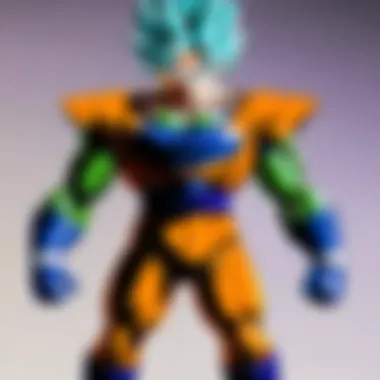
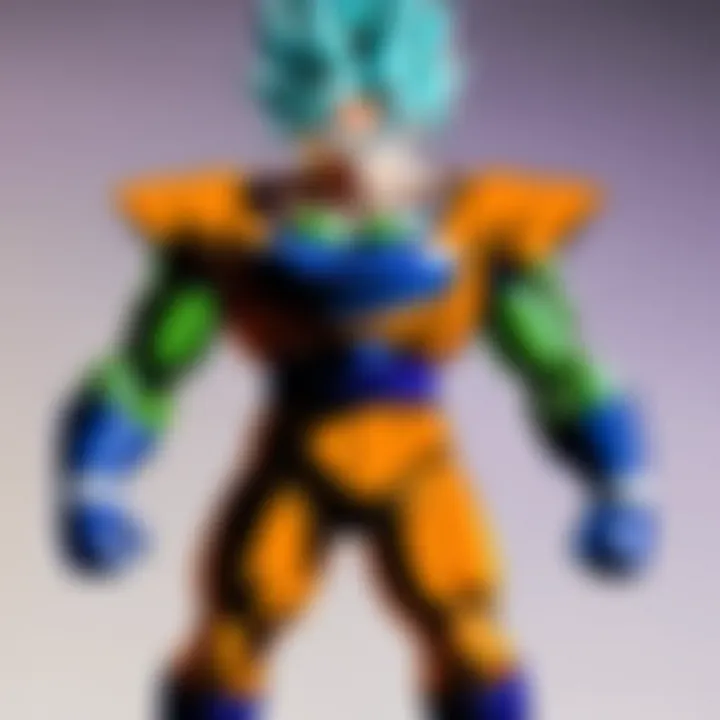
Intro
The Cell Games arc, standing as one of the most pivotal segments in the saga of Dragon Ball Z, serves as a rich tapestry of action, moral conflict, and deep character exploration. In this section, we will dissect the characters that take center stage and reflect upon their evolutions throughout these climactic battles. With legendary fighting sequences intertwined with profound emotional and philosophical stakes, the arc invites us to examine not just the power levels and martial prowess, but also the very essence of what it means to be courageous and human in the face of insurmountable odds.
Character Analysis
Overview of Character Development
Cell, as the main antagonist of this arc, embodies the complexities of genetic perfection and the tragedy of his creation. Born from the embryonic fusion of various fighters' cells, his persona swings between cold detachment and twisted charm, showcasing a kind of cold intellect that makes him both threatening and fascinating. The character's development hinges on his evolution from a mere biological experiment into a charismatic warrior who poses philosophical questions about existence and purpose.
On the other side of the spectrum, Gohan, the reluctant hero, undergoes a significant transformation. Initially depicted as a timid boy overwhelmed by his abilities, Gohan eventually steps into his own, embracing the legacy placed upon him by his father, Goku. This metamorphosis marks a crucial aspect of the narrative, for it signifies a shift from reliance on brute strength to inner fortitude and emotional resilience.
With characters like Vegeta and Piccolo also basking in their arcs, we witness a variety of traits as they navigate through camaraderie, rivalries, and personal growth. Vegeta's pride and desire for redemption contrast sharply with Piccolo's evolving sense of duty, adding layers to their personalities and reinforcing the theme of honor in battle.
Key Relationships and Dynamics
The interactions between these characters are central to the arc’s emotional depth. Goku and Gohan's father-son relationship exemplifies the poignant blend of support and pressure, as Goku pushes Gohan towards greatness while simultaneously fostering a nurturing bond. This dynamic reaches a crescendo during critical combat moments when Gohan faces Cell, ultimately showcasing the depth of their connection.
The rivalry and complex friendship between Goku and Vegeta shine a light on notions of rivalry versus partnership. Throughout the Cell Games, their exchanges reveal a layered understanding of motivation—Goku’s quest for challenge against Vegeta’s need for validation. This relationship becomes essential in understanding the balance of power and vulnerability in their personas.
Moreover, the chaotic dance between Cell and his opponents is more than mere martial combat. It highlights a larger commentary on fear and resilience, as Cell toys with the lives of the Z Fighters. His taunts reflect a dark mirror of their internal struggles, making each interaction significant in the broader context of growth or downfall.
"In the face of destiny, it’s not just the power of the strike but the strength of will that defines a warrior." - Wisdom of the Z Fighters
Thematic Exploration
Central Themes and Messages
At the heart of the Cell Games lies the exploration of choice and consequence. Characters are faced with dire situations that challenge their morals and values—whether it's Gohan summoning the resolve to emerge victorious or the stark dilemmas Cell presents during his sadistic games. The arc delves deeply into the idea that one's true character is revealed under pressure, making each decision weighty and impactful.
Furthermore, themes of redemption and legacy permeate the narrative. Each fighter embodies different perspectives on how to confront their past actions, be it through redemption arcs like Vegeta's or through inheritance like Gohan’s. These reflections shape the narrative into something greater than just battles; they emphasize humanity’s complexity and the eternal struggle with one’s self.
Cultural Context and Influences
The Cell Games arc not only exemplified brilliance in storytelling but also resonated culturally, influencing a generation of anime fans worldwide. The series' incorporation of traditional shōnen themes combined with an intricate plot setup garnered a dedicated following. The character arcs and intense emotional content strike a chord with audiences, making it essential viewing in the landscape of anime.
Moreover, the reactionary themes of good versus evil, the quest for strength, and the importance of camaraderie are concepts deeply embedded in both Eastern and Western cultures, establishing a universal appeal.
Engaging with the Cell Games arc allows fans to reflect on these cultural narratives, fostering a dialogue that transcends borders. The lessons learned about courage, sacrifice, and the drive to protect what is dear resonate on multiple levels, further solidifying Dragon Ball Z's legacy in the global anime community.
Intro to the Cell Games
The arc known as the Cell Games stands as a pivotal chapter in the Dragon Ball Z saga. It encapsulates the essence of struggle, growth, and the fight against seemingly insurmountable odds. This section will delve into the nuances of this arc, elucidating its importance and context within the overarching narrative of Dragon Ball Z.
Context within Dragon Ball Z
Set against a backdrop of escalating stakes and evolving character arcs, the Cell Games manifest as a culmination of prior confrontations, pushing the Z Fighters to their limits. This tournament isn’t just another set of battles; it's a stage where philosophical stakes reign supreme. From Goku’s unwavering belief in the potential of others to Cell's embodiment of the consequences of unchecked ambition, these layers add richness to the narrative.
In the wider Dragon Ball lore, the Cell Games introduce a villain unlike any before. Cell is not merely a brute; he represents the culmination of genetic engineering, showcasing what happens when intellect and power become twisted in pursuit of perfection. The ethical implications and the moral dilemmas faced by the Z Fighters during these games resonate well beyond the screen, engaging fans in discussions about responsibility and the nature of evil.
Importance of the Cell Games arc
The significance of the Cell Games arc can hardly be overstated. It's an arena for self-discovery and determination for many characters, especially Gohan, who emerges as a pivotal figure. We witness a shift in character dynamics, with more emphasis placed on Gohan's evolution than on Goku's traditional role as the protagonist. It challenges the very notion of power and highlights the burdens that come with it.
"The Cell Games isn’t merely about fighting; it’s about confronting one’s deepest fears and the legacy one wishes to leave behind."


This arc also serves as a critical benchmark for action animation, showcasing intense battles that are both strategic and emotionally charged. It threads the themes of sacrifice and legacy throughout, impacting not only the Z Fighters but also the viewers who grew alongside these characters.
In essence, the Cell Games stand as a monumental moment in the Dragon Ball Z narrative, merging action with deeper philosophical questions, and solidifying its place in pop culture history.
Character Prelimss
The character introductions in the Cell Games arc offer a fascinating glimpse into the world of Dragon Ball Z, showcasing not just powerful fighters but also their personalities, struggles, and growth. This particular section lays the groundwork for understanding the profound evolution of each character, key to the arc’s narrative.
Cell: The Ultimate Antagonist
Cell stands tall as an iconic villain within the Dragon Ball Z universe. He embodies the culmination of various traits from previous antagonists, making him a formidable and complex character. His design—that grotesque yet oddly appealing fusion of organic and mechanical elements—visually represents the essence of his character. Cell is not simply a destroyer; he is the manifestation of scientific ambition and the moral degradation that accompanies it. This depth is vital to the narrative, as it gives viewers a strong reason to root against him.
Cell's ambition to reach perfection adds another layer to his character; it drives the plot and creates tension. His ability to absorb other beings amplifies the stakes, making him not just a test of physical strength but of moral fortitude too. Goku, Vegeta, and Gohan must confront not only their power but their values as they face him. This ultimately influences their development, showing that the true battle involves more than fists—it’s about fighting against one’s inner demons, fears, and beliefs.
"A perfect being who seeks perfection; Cell is as much a reflection of humanity's aspirations as its flaws."
Cell’s unique ability to regenerate and transform into different forms is another interesting aspect. Each transformation marks a significant escalation in the threat he represents, escalating the tension in the games. A branch of science fiction stereotypically depicts the dangers of playing god, but here, it showcases the unforeseen consequences of seeking to transcend natural limits. In a way, Cell forces the Z Fighters to evaluate what it truly means to be ‘perfect.’
The Z Fighters and Their Evolution
The Z Fighters consist of a diverse group, each bringing their blend of skills, backgrounds, and dreams, enriching the storytelling. This diversity is essential to the dynamics of the Cell Games; it illustrates the power of unity in the face of overwhelming odds.
Each fighter experiences significant transformations during the Cell Games. Goku evolves further as a challenge, Vegeta strives for acknowledgment, and Gohan takes center stage. Their growth is not merely about elevating power levels, but also realizations of their potential, responsibilities, and moral convictions.
Goku, who is often seen as the epitome of strength, also embodies a philosophical perspective on combat—he seeks not only to defeat but to understand his opponents. His encounter with Cell serves as a turning point, one that questions the ethics of battling against someone who displays such an evolved sense of ambition and menace.
Vegeta, on the other hand, struggles with his identity as a warrior. His pride heavily influences his actions. While he initially appears self-serving, his character arc ultimately leads to selflessness, demonstrating how circumstances can reshape an individual’s motivations. The desire for recognition plays a pivotal role in his journey as he learns valuable lessons about camaraderie, sacrifice, and the price of his arrogance.
Gohan ultimately emerges as the most poignant representation of evolution. From a timid child to a determined fighter capable of utilizing his latent power, Gohan’s transformation reflects the themes of potential and expectations. As he faces Cell, he stands not just as Goku’s son but as a central hero who must fulfill not only his own destiny but also carry the weight of his father’s legacy.
This evolution of characters amid high-stakes battles highlights their personal journeys and interconnections, turning the Cell Games from mere combat into a profound exploration of growth, identity, and the significance of relationships among the Z Fighters.
The Structure of the Cell Games
The Cell Games present a meticulously crafted framework that not only illustrates the competitive nature of the tournament but also serves as a vehicle for character development and thematic exploration. The design of the tournament is pivotal in establishing stakes and tension. By setting up a structured competition, the audience is engaged not just in the battles themselves, but also in the motivations and personal transformations of the characters involved. This format sharply highlights the essence of each fighter's resolve, pushing them to confront both external threats and internal dilemmas.
Format and Rules of the Tournament
The tournament format of the Cell Games diverges from traditional combat, arranging battles in a unique way that magnifies excitement and unpredictability. The contest takes place on a grand stage, where Cell, as the orchestrator, dictates the rules. Here are some vital elements of this setup:
- One-on-One Battles: Each fighter faces Cell or another opponent individually, spotlighting their unique abilities and strategies.
- No Interruptions: The fights are to occur without interference, ensuring that the outcome reflects the fighters' skills and not outside factors.
- Time Limit: Rules stipulate a time limit for each battle, which raises the stakes and instills urgency.
- Victory Conditions: Defeating Cell or demonstrating exceptional bravery can result in victory, but the true essence lies in the fighters' personal growth, rather than just claims of supremacy.
This format is significant, as it forces each character to evolve under pressure, showcasing their values, fostered relationships, and individual arcs. The structure of the tournament emphasizes honor, resilience, and the bonds formed amongst the Z Fighters as they come together to face a common enemy.
Timeline of Events During the Games
The timeline of the Cell Games is a fluid sequence of pivotal moments that shape both the narrative and character arcs throughout the series. Events unfold with a compelling rhythm, marking significant battles that build tension:
- Opening Ceremony: Cell publicly invites the Z Fighters, presenting a clear call to action for those daring enough to confront him.
- First Battles: The tournament's initial fights showcase various characters. Goku's match against Cell serves as a benchmark, setting the tone for what’s to come.
- Increased Stakes: As battles unfold, the nature of each fight becomes a platform for the characters to not only flex their muscles but also explore motivations deeply rooted in their psyche.
- Gohan’s Transformation: Marked by the increasing pressure, Gohan’s character evolution culminates in a breathtaking moment—a turning point that underscores his journey from boyhood to maturity.
- Climactic Showdown: The sequence culminates in a high-stakes drama where Goku's teachings to Gohan come full circle as he stands up against Cell, illustrating the crux of mentorship.
"In the end, what resonates is how these events intertwine lives, showing us the intertwining themes of sacrifice and endurance."
The timeline serves as a backdrop to these narratives, enabling the audience to witness character growth not merely in isolated battles, but as a continuous evolution throughout the games. Each event builds upon the previous ones, creating a layered and rich storytelling experience that solidifies the Cell Games as a cornerstone of the Dragon Ball Z saga.
Key Battles and Strategies
In the Cell Games arc, battles don't just serve the purpose of entertainment; they become platforms for character growth and development. Each fight reveals not only the combatants' physical strengths but also their mental fortitude and moral dilemmas. Understanding these key battles provides insight into the broader themes of responsibility, sacrifice, and legacy within Dragon Ball Z.
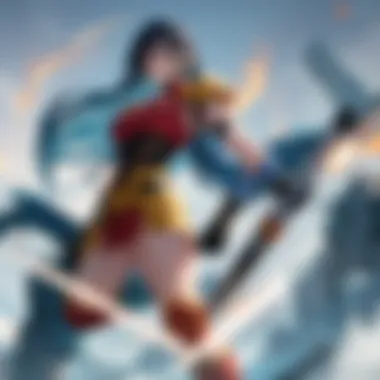

Goku vs. Cell: A Defining Moment
For many fans, the match between Goku and Cell stands tall amongst the defining moments of the series. Here, Goku showcases his unwavering spirit, even as he realizes that his chances of winning may be slim. Instead of a typical fight, Goku proposes a more philosophical approach: setting a tone for honor and respect.
Goku chooses to fight Cell not only to protect Earth but to ensure that he has found a worthy opponent. This choice leads to a compelling moment, where Goku sacrifices his own victory, preferring instead to pass the baton to his son, Gohan.
"Sometimes the greatest victory is to recognize the strength of your successor."
Goku’s decision embodies the theme of legacy and growth, turning a possible defeat into a moment of upliftment.
Vegeta's Struggle for Recognition
Vegeta's path in the Cell Games arc is one filled with complexity. His relentless desire to surpass Goku is palpable, yet it’s underscored by a need for recognition and validation. When he steps into the ring to fight Cell, he does so with pride layered with deep insecurities.
His battle showcases Vegeta’s evolution from a ruthless warrior to a character grappling with his own limitations. Even in his fight, the mere act of challenging Cell illustrates the warrior's classic struggle against fate. When he realizes he cannot defeat Cell, his frustration turns to rage, making his eventual defeat all the more poignant. It brings forth a powerful moment of humility for Vegeta, revealing that strength and recognition must come from within, not just from proving oneself against another's power.
Gohan’s Transformation and Growth
Among the most vital threads in the Cell Games is Gohan’s transformation. Initially seen as timid and hesitant, Gohan undergoes a remarkable evolution, driven by the dire circumstances of the tournament. His struggle is dual—fighting against Cell while reconciling his desire for peace with his inherent abilities.
The zenith of Gohan’s growth comes during the climax of his battle with Cell. As he witnesses the sacrifice of his father and the impending doom of his friends, he reaches his breaking point, compelling him to unleash his latent power: the Super Saiyan 2 transformation. This pivotal moment is a masterclass in storytelling, where Gohan embraces his role as a fighter while also acknowledging the costs of battle.
In Gohan, we see that true strength often comes from managing one’s emotions and realizing the responsibilities that power brings.
Through these key battles, a rich tapestry of growth, strategy, and ideological conflict emerges. They become not merely contests of might but reflections of the characters’ innermost struggles. In this way, the Cell Games resonate on multiple levels, offering fans not just thrilling moments, but deeper philosophical insights that linger long after the battles conclude.
Themes Explored in the Cell Games
The Cell Games arc is rich with themes that resonate deeply with the audience. It doesn't just showcase power battles; it delves into the essence of what it means to be strong, the heavy weight of responsibility, and the complex web of personal connections among the fighters. Understanding these themes is crucial for appreciating the deeper messages and character evolutions throughout the saga.
The Nature of Power and Responsibility
One of the most compelling themes in the Cell Games is the relationship between power and responsibility. Throughout this arc, characters grapple with the dire consequences that come with their incredible strength. Goku, for example, embodies this duality. His overwhelming desire to challenge Cell stems from a sense of justice and honor, yet it places his loved ones in mortal danger. This reflects the saying, "With great power comes great responsibility." Each fighter faces their own struggle as they decide how to wield their abilities.
The stakes are elevated when Gohan starts to come into his own. Initially a timid and reluctant hero, his transformation into the Ultimate Warrior underscores how power should be used wisely. His eventual struggle to embrace his strengths and the responsibilities that come with them paints a complex picture of growth and maturity.
Sacrifice and Redemption
In the Cell Games, sacrifice often interweaves with the theme of redemption. Characters make conscious decisions that lead them to put themselves on the line for others. For instance, the sacrifice made by Goku during his fight with Cell is not just physical; it's emotional. By willingly giving up his life in search of a better future, he sets the stage for Gohan's eventual success.
This theme also extends to Vegeta, whose pride leads him to confront Cell in a moment that defines his character. His desperate effort to prove himself results in a humbling defeat, but this also serves as a moment of reckoning. Vegeta's journey highlights that even the strongest can seek redemption and strive for personal growth.
"The Cell Games are not just battles; they're a lesson on what it means to sacrifice for the greater good."
The Role of Legacy in the Z Fighters' Journey
Lastly, the theme of legacy plays a pivotal role throughout the Cell Games. The Z Fighters are constantly reminded of the burden of their past. Goku's legacy as Earth's savior inspires confidence in his son, Gohan, while simultaneously fostering immense pressure on him. Likewise, Vegeta’s pride and his desire to surpass Goku fuels not only his rivalry with Kakarot but also deeply impacts Gohan’s approach to power.
Legacies shape the decisions the fighters make, often pushing them toward greatness but sometimes suffocating them under expectations. It's a delicate balance that raises questions about personal identity and growth. Gohan must navigate not only the expectations of his father’s legacy but also the new legacy he wishes to forge for himself.
As the tumultuous battles unfold, it becomes evident that the Cell Games are not only a stage for physical confrontation but also a significant exploration of what characters inherit from those before them and what they choose to leave for the next generation.
The Impact of the Cell Games on Characters
The Cell Games arc is not merely a collection of spectacular battles; it serves as the breeding ground for character evolution and interpersonal dynamics that resonate throughout the Dragon Ball Z series. As audiences witness the Z Fighters confront a foe like Cell, they also see the profound shifts taking place in their motivations, allegiances, and values. This segment of the story is crucial because it lays the groundwork for future arcs while deepening the viewer's connection to each character. Notably, the events affect not just the fighters, but also how they perceive power, sacrifice, and legacy in their lives and relationships.
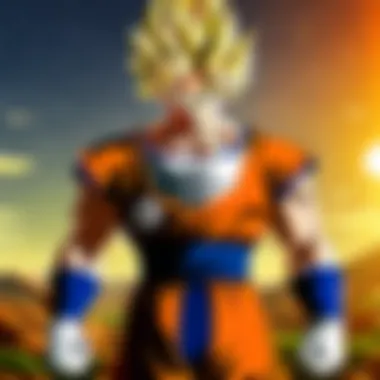
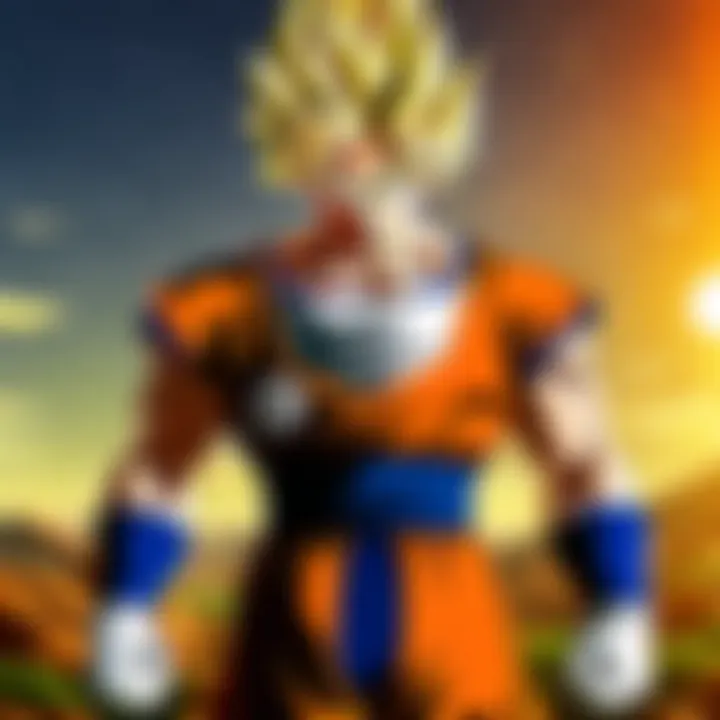
Character Development Over the Arc
Every fighter who enters the arena of the Cell Games encounters significant challenges that spur development. Take Gohan for example: once a timid child, he progressively steps into the role of savior. His transformation serves as a poignant reminder that power does not always come from simply having strength but also from understanding the responsibilities that accompany it. Gohan's evolution reflects a struggle that many fans relate to—growing up and facing daunting expectations while also discovering inner strength.
Moreover, Vegeta's character arc during this time is equally compelling. Throughout the Games, viewers see his facade of arrogance crack under the pressure of Cell's overwhelming power. His desperate fight against Cell highlights his inner turmoil, revealing a man haunted by the specter of a once-great Saiyan lineage. Vegeta's character development illustrates how ambition can lead to both greatness and despair, ultimately making him a more complex and relatable character.
On the other side of the spectrum, characters like Krillin and Piccolo also show notable arcs. Krillin's loyalty and bravery shine as he stands against mighty foes, proving that strength comes in different forms. Meanwhile, Piccolo, who once was Goku's adversary, continues to evolve into a mentor and ally, symbolizing the potential for growth and redemption in even the darkest of times.
Relationships Between Fighters
The Cell Games foster an intricate web of relationships among the fighters that adds layers to the narrative. Tension and camaraderie abound as the Z Fighters are pushed to their limits. The bond between Goku and Gohan intensifies, especially as Goku encourages Gohan to harness his latent power. This father-son relationship is beautifully nuanced; it underscores the importance of guidance and support in overcoming fears and challenges.
Furthermore, the dynamic between Goku and Vegeta is also noteworthy. Their rivalry becomes a catalyst for growth, with each fighter pushing the other to new heights. This competitive yet respectful relationship transforms into a partnership against a formidable enemy, indicating that cooperation can arise even from fierce rivalry. It challenges the notion that strength must always be rooted in isolation.
However, while the bonds grow stronger, the threat of Cell also brings forth division among the fighters. Fears of loss and inadequacy pervade, especially when characters like Tien and Yamcha find themselves marginalized in a world where power seems to reign supreme. This balance between unity and fragmentation adds depth to their interactions and brings to light the vulnerabilities that lie beneath the surface.
"In moments of crisis, true character is revealed. The Cell Games test not just strength but the very fabric of friendships and alliances in the Dragon Ball Z universe."
In summary, the impact of the Cell Games on characters within the saga encapsulates a tapestry of growth, struggle, and relationships that resonate deeply with the audience. As viewers engage with the journey of each fighter, they are not just spectators of epic battles but participants in a story about identity, power, and the significance of connections.
Cultural Significance of the Cell Games
The Cell Games arc stands as a cornerstone in the Dragon Ball Z saga, deeply impacting both the narrative and cultural landscape of the series. This segment not only encapsulates the essence of the battles fought but also delves into the philosophical questions about power, responsibility, and personal growth. These themes resonate with audiences on multiple levels and reflect broader societal issues.
Fan Reception and Critique
When the Cell Games were initially aired, reactions varied tremendously among fans and critics alike. Some heralded the arc as a masterstroke of character development and storytelling, praising how it explored the depths of human emotion intertwined with serious action. Many fans viewed Gohan's ascension as a pivotal moment—after all, the stakes had never felt higher. The moment Goku, known for his boundless confidence, willingly stepped aside to let Gohan shine marked a shift in narrative authority. This decision struck a chord not just within the series, but for viewers also navigating their personal journeys of growth.
On the flip side, there was an undercurrent of critique from those who felt the pacing dragged at times or that certain battles felt drawn out beyond necessity. Opponents of this arc often voiced concerns about the culmination of energy beams and transformations overshadowing character dialogues and personal conflicts. However, die-hard fans would argue that these elements were crucial for building tension, illustrating the stakes involved in not only the fights but in the characters' emotional journeys.
Importantly, the continuity of the series was also maintained through audience investment—the connection many viewers felt with the characters turned critique into conversation rather than dismissal, fostering a tight-knit community among anime fans.
Influence on Subsequent Anime and Manga
The legacy of the Cell Games extends beyond its own arc and has significantly influenced a myriad of anime and manga that followed. Many creators cite the blend of action, character complexity, and moral questions introduced during this saga as key inspirations in their own narratives.
Notable Influence on Future Works
- Character Development Structures: The articulation of character arcs, particularly through transformations, has been emulated in series like Naruto and My Hero Academia. Both series reflect character growth through profound struggles akin to what Gohan experienced, transforming from timid youth to powerful warrior.
- Tournament Formats: The respected, structured chaos of tournaments established in the Cell Games paved the way for similar arcs in series such as Hunter x Hunter and Fairy Tail. These arcs encapsulate the thrill of competition while delving into character backstories.
- Philosophical Themes: The essence of power intertwined with responsibility remains a paintbrush in modern storytelling. Series like Attack on Titan and One Punch Man draw heavily on these themes, exploring the consequences of power in various forms.
The effective blending of action, emotion, and philosophical musings in the Cell Games sets a landmark from which modern anime, grappling with issues of power and morality, often take inspiration.
It’s safe to say, the Cell Games arc did more than just entertain; it created a dialogue about dedicated growth amidst overwhelming odds, a message that remains pervasive and transformative in the anime community.
End
In wrapping up our exploration of the Cell Games, it's essential to recognize the multilayered significance this arc holds within the Dragon Ball Z universe. Not merely a showcase of jaw-dropping battles, the Cell Games encapsulates a myriad of themes that resonate deeply with viewers, making it a keystone in the narrative architecture of the series. The synergetic blend of character evolution and moral dilemmas encountered by the Z Fighters invites fans to reflect upon their own values and choices.
Legacy of the Cell Games in Dragon Ball Z
The legacy of the Cell Games extends well beyond the immediate thrill of martial arts. This arc introduced audiences to a realm where victory is often overshadowed by the weight of responsibility. Characters like Gohan, in particular, emerged as not just fighters, but as symbols of potential and the complexities of adolescence. Through Gohan’s triumph, we see a thematic echo of growth forged through struggle, a common motif in many coming-of-age stories.
Moreover, the Cell Games vehicle unity among diverse characters. Each fighter, from Goku to Krillin, contributes to the overall narrative, forging bonds that defy rivalry, emphasizing teamwork over individual strength. The lessons learned in this arc have found their way into the fabric of pop culture, influencing countless narratives across various media. These moments resonate because they go beyond the spectacle, offering moral quandaries that linger in the mind long after the final episode.
Enduring Appeal Among Fans
The Cell Games continue to captivate a dedicated fan base, stemming from the perfect blend of drama and action. Enthusiasts often relish how this arc not only showcases power struggles but also delves into personal stakes. The tension is palpable, especially during critical battles where every punch lands with deeper meaning. The animation, paired with a compelling score, elevates each skirmish into an unforgettable moment, creating an everlasting impression.
Fans have taken to platforms like Reddit to discuss intricacies of the battles and the moral implications of characters’ choices. This communal engagement amplifies the appeal, as viewers dissect the myriad ways the show reflects their own lives. Additionally, the nostalgia associated with the Cell Games creates a shared history among fans, further enhancing its allure.
The lasting impact of this arc is evident in fan art, cosplay, and discussions that underscore its cultural relevance. Indeed, both new and seasoned fans find common ground in the themes of resilience and bravery that the Cell Games exemplifies. As a result, it's no wonder that newcomers are still drawn into its fascinating world, eager to understand what led to the explosive climax of the saga.
Overall, the Cell Games serves not just as an entertainment spectacle but as a profound commentary on responsibility, growth, and the depths of human spirit, cementing its place as a pillar in the Dragon Ball Z legacy.















